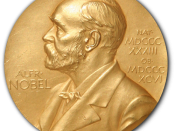In his 1985 will, Alfred Nobel, a Swedish industrialist who made his fortune by inventing and selling dynamite, left to posterity a sizable prize fund, stipulating that it be used each year to recognize those individuals "who shall have contributed most materially to benefit mankind." (Bishop, 52)
Today, the Nobel Prize is the most prestigious and coveted award in the world. It is the undisputed arbiter of greatness in physics, chemistry, physiology or medicine, literature, and peace - the five fields specified by Nobel - as well as in economics, which was added in 1968. Winners earn not just a gold medal and great sum of money - more than $900,000 last year - but also a considerable measure of intellectual and moral authority. "The awards seem almost to issue not from mere Stockholm," Istvan Hargittai writes in his engaging and comprehensive history, "but from some timeless Realm of Objective Judgment."
(Hargittai, 94)
Bishop, a professor of English recently retired from the University of Denver, celebrates the genuinely outstanding achievements that the Nobel Prize has so often served to recognize. But he is wary of the award's unparalled influence - and its carefully cultivated image of critical rigor. As he ably demonstrates, considerations other than mere excellence have long played a role in the bestowal of the world's most sought-after laurel. (Bishop, 68-69)
It is not easy to explain the success of the Nobel Prize. The Templeton Prize for progress in religion is more lucrative, and the Fields Medal in mathematics, awarded just once every four years, is harder to win. Moreover, the institutions that administer Nobel's legacy - three Swedish academies and the Norwegian parliament - are not otherwise thought to possess any special competence in discerning the heights of human achievement.
Nonetheless, Abrahams shows, the Nobel's track record...


